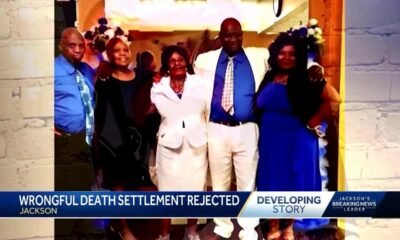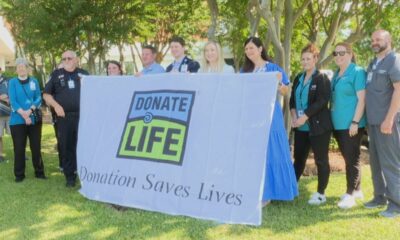Kaiser Health News
A Catch-22 for Clinics: State Bans Limit Abortion Counseling. Federal Title X Rules Require It.
by Rachana Pradhan
Fri, 26 May 2023 09:00:00 +0000
State abortion bans in Tennessee and beyond, which constrain women's health care, have put family planning clinics at risk of losing their federal funding.
The conflict involves the Title X family planning program, which provides services to low-income people, including minors. As of 2021, more than 3,200 clinics used federal grants to supply free or low-cost contraception, testing for sexually transmitted infections, screening for breast and cervical cancer, and pregnancy-related counseling.
Federal regulations for the program, which was established more than 50 years ago to reduce unintended pregnancies, say participating clinics must offer pregnant women information about terminating pregnancies and abortion referrals on request. But following those rules puts medical providers at odds with state laws banning abortion, some of which threaten jail time, fines, or the loss of medical licenses if they help someone end a pregnancy.
President Joe Biden's administration at the end of March cut off Tennessee's Title X funds after determining the state health department — which oversees its clinics and was awarded $7.1 million last year — violated federal rules by not counseling patients about abortion. “Continued funding is not in the best interest of the government,” two U.S. Department of Health and Human Services officials wrote to Tennessee officials on March 20. The state had more than 100 Title X clinics as of March, according to an HHS directory.
In 2022, the federal government awarded Title X grants to roughly 90 entities, a mix of state and local governments and private organizations. Those grantees distribute funds to public or private clinics.
Federal law prohibits clinics from using Title X money to pay for abortions. However, HHS requires clinics to offer pregnant women information about prenatal care and delivery, infant care, foster care, adoption, and pregnancy termination.
In states where abortion is generally illegal, that could mean directing patients to providers in other states. But Tennessee told family planning clinics they could discuss only services that were legal in the state — effectively cutting off any talk about abortion.
Tennessee allows abortions only under limited circumstances, including to save a pregnant person's life. State health department policies for family planning “are consistent with state law,” said Jade Byers, a spokesperson for Republican Gov. Bill Lee. Tennessee allocated state funds to replace the federal money.
Whitney Rice, director of Emory University's Center for Reproductive Health Research in the Southeast, said failing to provide timely information and referrals for abortion “could contribute to further delays in people's ability to access that care,” especially because women may need to travel long distances for it.
The clash over the federally funded clinics is part of the widening fallout from the Supreme Court's June 2022 decision in Dobbs v. Jackson Women's Health Organization ending the constitutional right to an abortion.
In Idaho, which has a near-total abortion ban, two Planned Parenthood clinics with Title X funding recently stopped giving patients abortion information and halted out-of-state referrals, according to a lawsuit Planned Parenthood and the American Civil Liberties Union filed in April against Idaho's attorney general.
State law prohibits providers from assisting in performing or attempting to perform an abortion, and violators risk having their medical license suspended.
The clinics' decision came after Idaho Attorney General Raúl Labrador, in a March 27 letter, said Idaho law prohibits providers from “referring a woman across state lines to access abortion services.”
That interpretation is “preventing medical professionals from providing full information to their patients,” said Mack Smith, spokesperson for Planned Parenthood Great Northwest, Hawaii, Alaska, Indiana, Kentucky.
Though Labrador later withdrew the letter, Planned Parenthood clinics there still are not referring patients out of state for abortions, Smith said.
Before Labrador's letter, the lawsuit states, Planned Parenthood staff would furnish general information about pregnancy options, a list of abortion providers in other states and organizations that help defray patients' abortion and related costs, and a flyer about Idaho's abortion law. Staff would also occasionally help patients schedule care outside of Idaho. Now, “Planned Parenthood providers no longer do so.”
“When my patients require abortions, I am now forced to tell them that I am unable to help them and that I cannot say anything about their abortion options in other states,” Caitlin Gustafson, a physician who had practiced at an Idaho Planned Parenthood clinic, said in a legal declaration.
Kimberley Harris, a visiting assistant professor at Texas Tech University School of Law, said clinicians in states with strict bans worry about referring patients to other states because a prosecutor could interpret that as “aiding and abetting an abortion.”
Facilitating medication abortion in particular could “pose potential risk to health care providers,” Harris said, because a patient they refer to obtain pills out of state might then take them in a state where abortion is illegal. Medication abortion accounts for most abortions in the U.S. and involves taking a series of pills during the first 10 weeks of pregnancy.
“The federal regulation might require me to provide counseling and provide information,” Harris said of clinicians. “But if you're telling providers that they may lose their license, or they might go to jail, or they might face a huge fine? Rightfully, they're going to be concerned.”
As senior HHS officials travel the country, they are getting an earful about the issue.
HHS spokesperson Tara Broido said that, increasingly, “providers and patients have raised concerns about the impact that the Dobbs decision has had on access” to pregnancy counseling and referrals.
KFF Health News asked Broido which grantees have not been following the counseling and referral requirements. She declined to say.
People who use Title X's services are disproportionately women. A report from HHS' Office of Population Affairs said roughly two-thirds of 1.7 million patients in 2021 had family incomes at or below the poverty line. Thirty-six percent were uninsured, more than two times the national uninsured rate for adults.
The Office of Population Affairs and the Centers for Disease Control and Prevention jointly recommend family planning services that clinics are expected to follow. They include pregnancy testing and counseling.
The Title X program has been whipsawed before.
In 2019, the Trump administration barred Title X clinics from making abortion referrals. And the administration said abortion providers couldn't share physical space with Title X clinics. The number of participating clinics subsequently dropped sharply — from 3,825 sites in 2019 to 3,031 the following year. With fewer clinics, the number of people receiving free or low-cost family planning services through the program plummeted from 3.1 million in 2019 to 1.5 million in 2020.
The Biden administration in 2021 overturned many of the Trump policies. The Biden rules remain in effect, but several states sued to block them. That litigation is ongoing.
Sarah Parshall Perry, a senior legal fellow at the conservative Heritage Foundation think tank, anticipates additional challenges to Title X rules because “states have an interest in defending their own laws and their ability to enforce their own laws.”
In Texas, which prohibits abortion with few exceptions, the nonprofit Every Body Texas oversees 154 Title X family planning clinics.
Its providers are still counseling pregnant women about options, but “that's not to say it hasn't been made very, very difficult,” said Stephanie LeBleu, the group's acting Title X director.
LeBleu said the approach to counseling “can look different” from clinic to clinic. For example, clinics in rural Texas “have to be a lot more cautious about how they share information with their clients,” LeBleu said. Sometimes that means making a “referral to the referral” — such as directing patients to organizations like All-Options, which operates a national pregnancy options hotline.
ask for information on pregnancy options, “our clinics refer clients to other resources,” Karen M. Landers, chief medical officer for the Alabama Department of Public Health, said in a statement. The department declined to say what those resources are and whether clinicians worry about being prosecuted under Alabama law for providing abortion counseling or referrals.
“Clients are additionally informed of the legality of pregnancy termination in the state,” Landers wrote.
By: Rachana Pradhan
Title: A Catch-22 for Clinics: State Bans Limit Abortion Counseling. Federal Title X Rules Require It.
Sourced From: kffhealthnews.org/news/article/family-planning-clinics-abortion-counseling-state-bans-federal-rules/
Published Date: Fri, 26 May 2023 09:00:00 +0000
Kaiser Health News
KFF Health News’ ‘What the Health?’: Abortion — Again — At the Supreme Court
Wed, 24 Apr 2024 20:30:00 +0000
The Host
Julie Rovner
KFF Health News
Julie Rovner is chief Washington correspondent and host of KFF Health News' weekly health policy news podcast, “What the Health?” A noted expert on health policy issues, Julie is the author of the critically praised reference book “Health Care Politics and Policy A to Z,” now in its third edition.
Some justices suggested the Supreme Court had said its piece on abortion law when it overturned Roe v. Wade in 2022. This term, however, the court has agreed to review another abortion case. At issue is whether a federal law requiring emergency care in hospitals overrides Idaho's near-total abortion ban. A decision is expected by summer.
Meanwhile, the Centers for Medicare & Medicaid finalized the first-ever minimum staffing requirements for nursing homes participating in the programs. But the industry argues that there are not enough workers to hire to meet the standards.
This week's panelists are Julie Rovner of KFF Health News, Joanne Kenen of the Johns Hopkins University's nursing and public health schools and Politico Magazine, Tami Luhby of CNN, and Alice Miranda Ollstein of Politico.
Panelists
Joanne Kenen
Johns Hopkins University and Politico
Tami Luhby
CNN
Alice Miranda Ollstein
Politico
Among the takeaways from this week's episode:
- This week's Supreme Court hearing on emergency abortion care in Idaho was the first challenge to a state's abortion ban since the overturn of the constitutional right to an abortion. Unlike previous abortion cases, this one focused on the everyday impacts of bans on abortion care — cases in which pregnant patients experienced medical emergencies.
- Establishment medical groups and doctors themselves are getting more vocal and active as states set laws on abortion access. In a departure from earlier political moments, some major medical groups are campaigning on state ballot measures.
- Medicaid officials this week finalized new rules intended to more closely regulate managed-care plans that enroll Medicaid patients. The rules are intended to ensure, among other things, that patients have prompt access to needed primary care doctors and specialists.
- Also this week, the Federal Trade Commission voted to ban most “noncompete” clauses in employment contracts. Such language has become common in health care and prevents not just doctors but other health workers from changing jobs — often forcing those workers to move or commute to leave a position. Business interests are already suing to block the new rules, claiming they would be too expensive and risk the loss of proprietary information to competitors.
- The fallout from the cyberattack of Change Healthcare continues, as yet another group is demanding ransom from UnitedHealth Group, Change's owner. UnitedHealth said in a statement this week that the records of “a substantial portion of America” may be involved in the breach.
Plus for “extra credit” the panelists suggest health policy stories they read this week that they think you should read, too:
Julie Rovner: NBC News' “Women Are Less Likely To Die When Treated by Female Doctors, Study Suggests,” by Liz Szabo.
Alice Miranda Ollstein: States Newsroom's “Loss of Federal Protection in Idaho Spurs Pregnant Patients To Plan for Emergency Air Transport,” by Kelcie Moseley-Morris.
Tami Luhby: The Associated Press' “Mississippi Lawmakers Haggle Over Possible Medicaid Expansion as Their Legislative Session Nears End,” by Emily Wagster Pettus.
Joanne Kenen: States Newsroom's “Missouri Prison Agency To Pay $60K for Sunshine Law Violations Over Inmate Death Records,” by Rudi Keller.
Also mentioned on this week's podcast:
- American Economic Review's “Is There Too Little Antitrust Enforcement in the U.S. Hospital Sector?” by Zarek Brot-Goldberg, Zack Cooper, Stuart Craig, and Lev Klarnet.
- KFF Health News' “Medical Providers Still Grappling With UnitedHealth Cyberattack: ‘More Devastating Than Covid,” by Samantha Liss.
Credits
Francis Ying
Audio producer
Emmarie Huetteman
Editor
To hear all our podcasts, click here.
And subscribe to KFF Health News' “What the Health?” on Spotify, Apple Podcasts, Pocket Casts, or wherever you listen to podcasts.
——————————
Title: KFF Health News' ‘What the Health?': Abortion — Again — At the Supreme Court
Sourced From: kffhealthnews.org/news/podcast/what-the-health-344-abortion-supreme-court-april-25-2024/
Published Date: Wed, 24 Apr 2024 20:30:00 +0000
Did you miss our previous article…
https://www.biloxinewsevents.com/mandatory-reporting-laws-meant-to-protect-children-get-another-look/
Kaiser Health News
Mandatory Reporting Laws Meant To Protect Children Get Another Look
Kristin Jones
Thu, 25 Apr 2024 09:00:00 +0000
More than 60 years ago, policymakers in Colorado embraced the idea that early intervention could prevent child abuse and save lives. The state's requirement that certain professionals tell officials when they suspect a child has been abused or neglected was among the first mandatory reporting laws in the nation.
Since then, mandatory reporting laws have expanded nationally to include more types of maltreatment — including neglect, which now accounts for most reports — and have increased the number of professions required to report. In some states, all adults are required to report what they suspect may be abuse or neglect.
But now there are efforts in Colorado and other states to roll back these laws, saying the result has been too many unfounded reports, and that they disproportionately harm families that are poor, Black, or Indigenous, or have members with disabilities.
“There's a long, depressing history based on the approach that our primary response to a struggling family is reporting,” said Mical Raz, a physician and historian at the University of Rochester in New York. “There's now a wealth of evidence that demonstrates that more reporting is not associated with better outcomes for children.”
Stephanie Villafuerte, Colorado's child protection ombudsman, oversees a task force to reexamine the state's mandatory reporting laws. She said the group is seeking to balance a need to report legitimate cases of abuse and neglect with a desire to weed out inappropriate reports.
“This is designed to help individuals who are disproportionately impacted,” Villafuerte said. “I'm hoping it's the combination of these efforts that could make a difference.”
Some critics worry that changes to the law could result in missed cases of abuse. Medical and child care workers on the task force have expressed concern about legal liability. While it's rare for people to be criminally charged for failure to report, they can also face civil liability or professional repercussions, including threats to their licenses.
Being reported to child protective services is becoming increasingly common. More than 1 in 3 children in the United States will be the subject of a child abuse and neglect investigation by the time they turn 18, according to the most frequently cited estimate, a 2017 study funded by the Department of Health and Human Services' Children's Bureau.
Black and Native American families, poor families, and parents or children with disabilities experience even more oversight. Research has found that, among these groups, parents are more likely to lose parental rights and children are more likely to wind up in foster care.
In an overwhelming majority of investigations, no abuse or neglect is substantiated. Nonetheless, researchers who study how these investigations affect families describe them as terrifying and isolating.
In Colorado, the number of child abuse and neglect reports has increased 42% in the past decade and reached a record 117,762 last year, according to state data. Roughly 100,000 other calls to the hotline weren't counted as reports because they were requests for information or were about matters like child support or adult protection, said officials from the Colorado Department of Human Services.
The increase in reports can be traced to a policy of encouraging a broad array of professionals — including school and medical staff, therapists, coaches, clergy members, firefighters, veterinarians, dentists, and social workers — to call a hotline whenever they have a concern.
These calls don't reflect a surge in mistreatment. More than two-thirds of the reports received by agencies in Colorado don't meet the threshold for investigation. Of the children whose cases are assessed, 21% are found to have experienced abuse or neglect. The actual number of substantiated cases has not risen over the past decade.
While studies do not demonstrate that mandatory reporting laws keep children safe, the Colorado task force reported in January, there is evidence of harm. “Mandatory reporting disproportionately impacts families of color” — initiating contact between child protection services and families who routinely do not present concerns of abuse or neglect, the task force said.
The task force said it is analyzing whether better screening might mitigate “the disproportionate impact of mandatory reporting on under-resourced communities, communities of color and persons with disabilities.”
The task force pointed out that the only way to report concerns about a child is with a formal report to a hotline. Yet many of those calls are not to report abuse at all but rather attempts to connect children and families with resources like food or housing assistance.
Hotline callers may mean to help, but the families who are the subjects of mistaken reports of abuse and neglect rarely see it that way.
That includes Meighen Lovelace, a rural Colorado resident who asked KFF Health News not to disclose their hometown for fear of attracting unwanted attention from local officials. For Lovelace's daughter, who is neurodivergent and has physical disabilities, the reports started when she entered preschool at age 4 in 2015. The teachers and medical providers making the reports frequently suggested that the county human services agency could assist Lovelace's family. But the investigations that followed were invasive and traumatic.
“Our biggest looming fear is, ‘Are you going to take our children away?'” said Lovelace, who is an advocate for the Colorado Cross-Disability Coalition, an organization that lobbies for the civil rights of people with disabilities. “We're afraid to ask for help. It's keeping us from entering services because of the fear of child welfare.”
State and county human services officials said they could not comment on specific cases.
The Colorado task force plans to suggest clarifying the definitions of abuse and neglect under the state's mandatory reporting statute. Mandatory reporters should not “make a report solely due to a family/child's race, class or gender,” nor because of inadequate housing, furnishings, income or clothing. Also, there should not be a report based solely on the “disability status of the minor, parent or guardian,” according to the group's draft recommendation.
The task force plans to recommend additional training for mandatory reporters, help for professionals who are deciding whether to make a call, and an alternative phone number, or “warmline,” for cases in which callers believe a family needs material assistance, rather than surveillance.
Critics say such changes could leave more children vulnerable to unreported abuse.
“I'm concerned about adding systems such as the warmline, that kids who are in real danger are going to slip through the cracks and not be helped,” said Hollynd Hoskins, an attorney who represents victims of child abuse. Hoskins has sued professionals who fail to report their suspicions.
The Colorado task force includes health and education officials, prosecutors, victim advocates, county child welfare representatives and attorneys, as well as five people who have experience in the child welfare system. It intends to finalize its recommendations by early next year in the hope that state legislators will consider policy changes in 2025. Implementation of any new laws could take several years.
Colorado is one of several states — including New York and California — that have recently considered changes to restrain, rather than expand, reporting of abuse. In New York City, teachers are being trained to think twice before making a report, while New York state introduced a warmline to help connect families with resources like housing and child care. In California, a state task force aimed at shifting “mandated reporting to community supporting” is planning recommendations similar to Colorado's.
Among those advocating for change are people with experience in the child welfare system. They include Maleeka Jihad, who leads the Denver-based MJCF Coalition, which advocates for the abolition of mandatory reporting along with the rest of the child welfare system, citing its damage to Black, Native American, and Latino communities.
“Mandatory reporting is another form of keeping us policed and surveillanced by whiteness,” said Jihad, who as a child was taken from the care of a loving parent and placed temporarily into the foster system. Reform isn't enough, she said. “We know what we need, and it's usually funding and resources.”
Some of these resources — like affordable housing and child care — don't exist at a level sufficient for all the Colorado families that need them, Jihad said.
Other services are out there, but it's a matter of finding them. Lovelace said the reports ebbed after the family got the help it needed, in the form of a Medicaid waiver that paid for specialized care for their daughter's disabilities. Their daughter is now in seventh grade and doing well.
None of the caseworkers who visited the family ever mentioned the waiver, Lovelace said. “I really think they didn't know about it.”
——————————
By: Kristin Jones
Title: Mandatory Reporting Laws Meant To Protect Children Get Another Look
Sourced From: kffhealthnews.org/news/article/child-abuse-mandatory-reporting-laws-colorado/
Published Date: Thu, 25 Apr 2024 09:00:00 +0000
Did you miss our previous article…
https://www.biloxinewsevents.com/genetics-studies-have-a-diversity-problem-that-researchers-struggle-to-fix/
Kaiser Health News
Genetics Studies Have a Diversity Problem That Researchers Struggle To Fix
Lauren Sausser
Thu, 25 Apr 2024 09:00:00 +0000
CHARLESTON, S.C. — When he recently walked into the dental clinic at the Medical University of South Carolina donning a bright-blue pullover with “In Our DNA SC” embroidered prominently on the front, Lee Moultrie said, two Black women stopped him to ask questions.
“It's a walking billboard,” said Moultrie, a health care advocate who serves on the community advisory board for In Our DNA SC, a study underway at the university that aims to enroll 100,000 South Carolinians — including a representative percentage of Black people — in genetics research. The goal is to better understand how genes affect health risks such as cancer and heart disease.
Moultrie, who is Black and has participated in the research project himself, used the opportunity at the dental clinic to encourage the women to sign up and contribute their DNA. He keeps brochures about the study in his car and at the barbershop he visits weekly for this reason. It's one way he wants to help solve a problem that has plagued the field of genetics research for decades: The data is based mostly on DNA from white people.
Project leaders in Charleston told KFF Health News in 2022 that they hoped to enroll participants who reflect the demographic diversity of South Carolina, where just under 27% of residents identify as Black or African American. To date, though, they've failed to hit that mark. Only about 12% of the project's participants who provided sociodemographic data identify as Black, while an additional 5% have identified as belonging to another racial minority group.
“We'd like to be a lot more diverse,” acknowledged Daniel Judge, principal investigator for the study and a cardiovascular genetics specialist at the Medical University of South Carolina.
Lack of diversity in genetics research has real health care implications. Since the completion more than 20 years ago of the Human Genome Project, which mapped most human genes for the first time, close to 90% of genomics studies have been conducted using DNA from participants of European descent, research shows. And while human beings of all races and ancestries are more than 99% genetically identical, even small differences in genes can spell big differences in health outcomes.
“Precision medicine” is a term used to describe how genetics can improve the way diseases are diagnosed and treated by considering a person's DNA, environment, and lifestyle. But if this emerging field of health care is based on research involving mostly white people, “it could lead to mistakes, unknowingly,” said Misa Graff, an associate professor in epidemiology at the University of North Carolina and a genetics researcher.
In fact, that's already happening. In 2016, for example, research found that some Black patients had been misdiagnosed with a potentially fatal heart condition because they'd tested positive for a genetic variant thought to be harmful. That variant is much more common among Black Americans than white Americans, the research found, and is considered likely harmless among Black people. Misclassifications can be avoided if “even modest numbers of people from diverse populations are included in sequence databases,” the authors wrote.
The genetics research project in Charleston requires participants to complete an online consent form and submit a saliva sample, either in person at a designated lab or collection event or by mail. They are not paid to participate, but they do receive a report outlining their DNA results. Those who test positive for a genetic marker linked to cancer or high cholesterol are offered a virtual appointment with a genetics counselor free of charge.
Some research projects require more time from their volunteers, which can skew the pool of participants, Graff said, because not everyone has the luxury of free time. “We need to be even more creative in how we obtain people to help contribute to studies,” she said.
Moultrie said he recently asked project leaders to reach out to African American media outlets throughout the Palmetto State to explain how the genetics research project works and to encourage Black people to participate. He also suggested that when researchers talk to Black community leaders, such as church pastors, they ought to persuade those leaders to enroll in the study instead of simply passing the message along to their congregations.
“We have new ideas. We have ways we can do this,” Moultrie said. “We'll get there.”
Other ongoing efforts are already improving diversity in genetics research. At the National Institutes of Health, a program called “All of Us” aims to analyze the DNA of more than 1 million people across the country to build a diverse health database. So far, that program has enrolled more than 790,000 participants. Of these, more than 560,000 have provided DNA samples and about 45% identify as being part of a racial or ethnic minority group.
“Diversity is so important,” said Karriem Watson, chief engagement officer for the All of Us research program. “When you think about groups that carry the greatest burden of disease, we know that those groups are often from minoritized populations.”
Diverse participation in All of Us hasn't come about by accident. NIH researchers strategically partnered with community health centers, faith-based groups, and Black fraternities and sororities to recruit people who have been historically underrepresented in biomedical research.
In South Carolina, for example, the NIH works with Cooperative Health, a network of federally qualified health centers near the state capital that serve many patients who are uninsured and Black, to recruit patients for All of Us. Eric Schlueter, chief medical officer of Cooperative Health, said the partnership works because their patients trust them.
“We have a strong history of being integrated into the community. Many of our employees grew up and still live in the same communities that we serve,” Schlueter said. “That is what is part of our secret sauce.”
So far, Cooperative Health has enrolled almost 3,000 people in the research program, about 70% of whom are Black.
“Our patients are just like other patients,” Schlueter said. “They want to be able to provide an opportunity for their children and their children's children to have better health, and they realize this is an opportunity to do that.”
Theoretically, researchers at the NIH and the Medical University of South Carolina may be trying to recruit some of the same people for their separate genetics studies, although nothing would prevent a patient from participating in both efforts.
The researchers in Charleston acknowledge they still have work to do. To date, In Our DNA SC has recruited about half of the 100,000 people it hopes for, and of those, about three-quarters have submitted DNA samples.
Caitlin Allen, a program investigator and a public health researcher at the medical university, acknowledged that some of the program's tactics haven't succeeded in recruiting many Black participants.
For example, some patients scheduled to see providers at the Medical University of South Carolina receive an electronic message through their patient portal before an appointment, which includes information about participating in the research project. But studies show that racial and ethnic minorities are less likely to engage with their electronic health records than white patients, Allen said.
“We see low uptake” with that strategy, she said, because many of the people researchers are trying to engage likely aren't receiving the message.
The study involves four research coordinators trained to take DNA samples, but there's a limit to how many people they can talk to face-to-face. “We're not necessarily able to go into every single room,” Allen said.
That said, in-person community events seem to work well for enrolling diverse participants. In March, In Our DNA SC research coordinators collected more than 30 DNA samples at a bicentennial event in Orangeburg, South Carolina, where more than 60% of residents identify as Black. Between the first and second year of the research project, Allen said, In Our DNA SC doubled the number of these community events that research coordinators attended.
“I would love to see it ramp up even more,” she said.
——————————
By: Lauren Sausser
Title: Genetics Studies Have a Diversity Problem That Researchers Struggle To Fix
Sourced From: kffhealthnews.org/news/article/genetics-research-diversity-conundrum-black-participation-south-carolina/
Published Date: Thu, 25 Apr 2024 09:00:00 +0000
Did you miss our previous article…
https://www.biloxinewsevents.com/tire-toxicity-faces-fresh-scrutiny-after-salmon-die-offs/
-
228Sports5 days ago
From Heartbreak to Hoop Dreams: Pascagoula Panthers Springboard from Semifinal Setback to College Courts
-
Mississippi News4 days ago
2 dead, 6 hurt in shooting at Memphis, Tennessee block party: police
-
Mississippi News4 days ago
Forest landowners can apply for federal emergency loans
-
Local News10 hours ago
Sister of Mississippi man who died after police pulled him from car rejects lawsuit settlement
-
Mississippi News6 days ago
Burnsville man arrested in Prentiss County on drug related charges
-
Mississippi Today10 hours ago
At Lake High School in Scott County, the Un-Team will never be forgotten
-
Mississippi News3 days ago
Cicadas expected to takeover north Mississippi counties soon
-
Mississippi News Video7 days ago
All Scholastic Sports Team 2024: Katherine Bounds




































